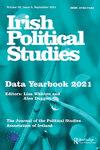At the table: women’s participation and influence in Ireland’s first decade of deliberative-democratic innovation
IF 0.8
4区 社会学
Q3 POLITICAL SCIENCE
引用次数: 1
Abstract
ABSTRACT Since the We the Citizens project of 2011, Ireland has begun to establish itself as a world leader in the use of national deliberative fora for considering policy change. In many ways, it marks a radical departure from the tightly-controlled, executive-dominated parliamentary politics of Dáil Éireann. Thus far, innovative deliberative processes have had a direct influence on two hugely transformative moral/social referendums: the marriage equality referendum of 2015 (recommended by the 2013–14 Convention on the Constitution) and the abortion referendum of 2018 (recommended by the Citizens’ Assembly in 2017). With the extensive recommendations of the recent Citizens’ Assembly on Gender Equality, there may yet be more deliberation-led social transformation to come. This paper considers the involvement and influence of women in Ireland’s deliberative processes and their contribution to the country’s ongoing social transformation. Particular attention is paid to the much greater descriptive representation offered by these sortition-formed assemblies compared to Ireland’s electoral bodies, and their record of delivering ‘woman-friendly’ outcomes is assessed. Consideration is also given to the possibility that these processes may resolve some of the tension between descriptive and substantive representation through women’s direct participation in deliberative decision-making.圆桌会议:妇女在爱尔兰审议民主创新的第一个十年中的参与和影响
摘要自2011年“我们是公民”项目以来,爱尔兰已开始在利用国家审议论坛审议政策变化方面确立自己的世界领先地位。在很多方面,这标志着与代尔安严格控制、行政主导的议会政治的彻底背离。到目前为止,创新的审议程序对两次极具变革性的道德/社会公投产生了直接影响:2015年的婚姻平等公投(2013-14年《宪法公约》建议)和2018年的堕胎公投(2017年公民大会建议)。随着最近关于两性平等的公民大会提出的广泛建议,未来可能会有更多由审议主导的社会变革。本文探讨了妇女在爱尔兰审议过程中的参与和影响,以及她们对该国正在进行的社会转型的贡献。特别注意的是,与爱尔兰的选举机构相比,这些分类组成的议会提供了更大的描述性代表性,并对其提供“女性友好”结果的记录进行了评估。还考虑到,这些进程可能通过妇女直接参与审议决策来解决描述性代表性和实质性代表性之间的一些紧张关系。
本文章由计算机程序翻译,如有差异,请以英文原文为准。
求助全文
约1分钟内获得全文
求助全文

 求助内容:
求助内容: 应助结果提醒方式:
应助结果提醒方式:


